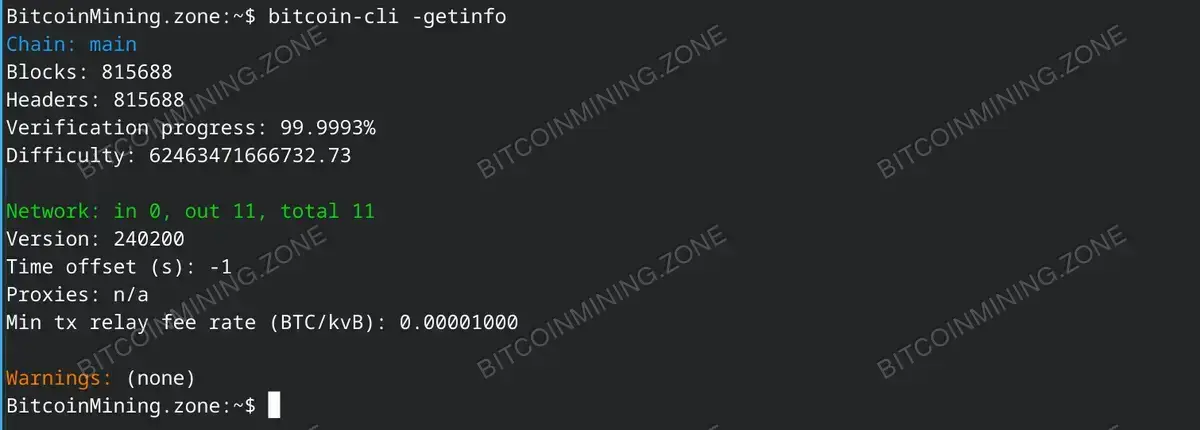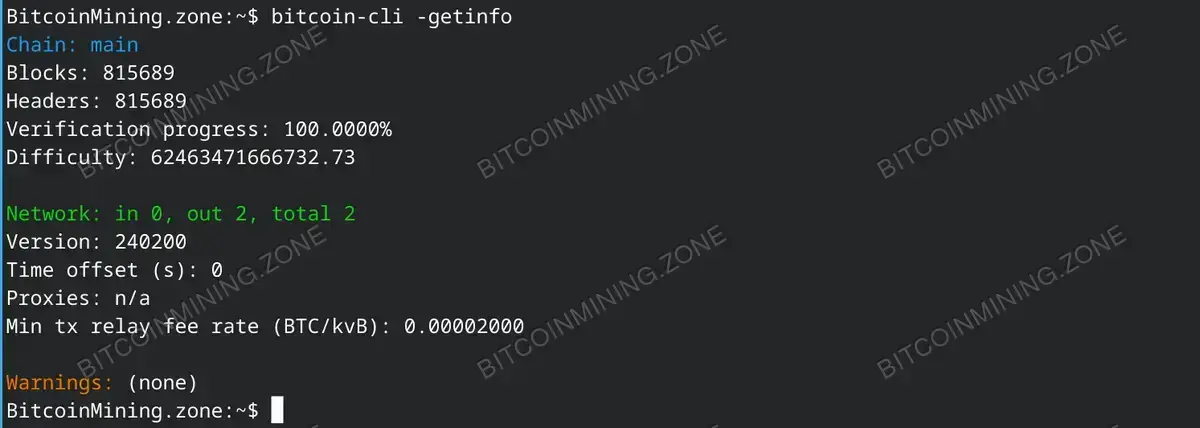In the quest to understand bitcoin mining, you’re likely to encounter several terms that may seem complex at first glance. Among these, a key term to understand is the ‘Min tx relay fee rate (BTC/kvB).’ This concept is integral to the efficient performance of a Bitcoin node in the greater Bitcoin network. This article aims to unpack the definition, functionality, significance, and usage of this term in layman’s terms.
Understanding the ‘Min tx relay fee rate (BTC/kvB)’:
When you utilise the command bitcoin-cli -getinfo, the output includes ‘Min tx relay fee rate (BTC/kvB): 0.00001000.’ Understanding each component of this line is crucial to apprehend its relevance in bitcoin mining.

Min tx relay fee rate (BTC/kvB
Min tx relay fee rate:
This term refers to the minimum transaction relay fee rate that a Bitcoin node accepts to relay transactions to other nodes in the network. If a transaction has a fee rate lesser than this specified amount, the node usually does not relay it. This measure exists to prevent the network from being inundated with low-fee, spam transactions that could clog the memory pool, called the ‘mempool.’
BTC/kvB:
BTC/kvB stands for ‘Bitcoin per kilo-virtual-byte.’ This unit is an indicator of Bitcoin transaction fees, calculated based on the size of the transaction in virtual bytes (vbytes). The fee denotes the amount of bitcoin a transaction pays per vbyte of data. It uses a unit called a vbyte, which determines the weight of a transaction based on its possible impact on blockchain congestion.
0.00001000:
This figure denotes the actual minimum fee rate set by the node, represented in Bitcoin (BTC). In this scenario, the node will not relay any transactions paying less than 0.00001000 BTC per kilo-virtual-byte.
The core functionality of this standard is to screen out transactions offering insufficient incentives for miners to include them in a block. It is a feature designed to safeguard the node’s mempool from low-fee transactions that might delay confirmation and compromise the node’s performance and the overall network health.
Modifying the ‘Min tx relay fee rate’:
The configuration of the minimum transaction relay fee rate on a Bitcoin node is flexible. Bitcoin node operators can modify this parameter using either command-line argument with bitcoind/bitcoin-qt or by altering the bitcoin.conf file.
Using Command-Line Argument:
Employ the `-minrelaytxfee=’ command-line argument when launching your Bitcoin node to input your desired fee rate. An illustrative command would be:
$ bitcoind -minrelaytxfee=0.00002
This command sets the minimum relay fee rate to 0.00002 BTC per kilo-virtual-byte.
Editing the bitcoin.conf File:
Modifying the bitcoin.conf file is another way to change the minimum relay fee rate. This is a configuration file that your Bitcoin node reads upon startup.
- Locations of bitcoin.conf files vary across operating systems:
- Linux: ~/.bitcoin/bitcoin.conf
- macOS: ~/Library/Application Support/Bitcoin/bitcoin.conf
- Windows: %APPDATA%\Bitcoin\bitcoin.conf
- Open the bitcoin.conf file with a text editor.
- Add this line to adjust the minimum relay fee rate:
minrelaytxfee=0.00002 - Lastly, save the file, restart your Bitcoin node, and the changes will take effect.
$ bitcoin-cli stop $ bitcoin -daemon

Updated Min tx relay fee rate (BTC/kvB)
Remember, setting this rate too low may lead to your transactions being overlooked by nodes with a higher relay fee setting. Conversely, a high fee rate could compromise your node’s ability to relay a substantial number of network transactions, impacting its connectivity and the accuracy of the network status information it receives. Thus, it’s crucial to settle on a rate that balances both these considerations.
Understanding the importance of the Min tx relay fee rate and being able to manipulate it are gradual steps toward mastering bitcoin mining. Share your experiences, queries, or thoughts in the comments below.
FAQ:
1. What is the ‘min tx relay fee rate’ in Bitcoin mining?
The ‘min tx relay fee rate’ is the smallest fee rate that your Bitcoin node is willing to accept to relay transactions to other nodes on the network.
2. How can the ‘min tx relay fee rate’ be modified?
The ‘min tx relay fee rate’ can be modified either by using a command-line argument when the Bitcoin node is initiated, or by editing the ‘bitcoin.conf’ file.
COMMON ERRORS AND TROUBLESHOOTING:
1. My transactions are not being relayed. What might be the cause?
If your transactions are not being relayed, it might be because the fee rate is set too low and nodes with higher relay fee settings are overlooking your transactions. Try increasing the value of the ‘min tx relay fee rate.’
2. My Bitcoin node isn’t relaying many transactions. How can I rectify this?
If your Bitcoin node isn’t relaying many transactions, it could be because you’ve set your minimum relay fee rate too high. Adjusting it to a lower value could resolve this issue.

